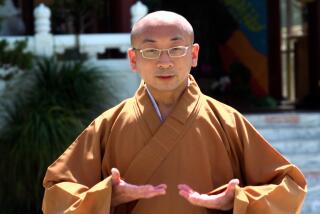Monk Tycoon Builds a Buddhist Empire
- Share via
TAIPEI, Taiwan — Hsing Yun TAIPEI, Taiwan--Hsing Yun fled China in 1949 with only his gray robe and cotton shoes. Today, he is a millionaire monk, praised by some as a philanthropist, reviled by others as a mail-order preacher.
He has more than 400,000 disciples in Taiwan, 27 monasteries around the world and assets valued at more than $400 million.
In two decades, Hsing Yun has fashioned a Buddhist empire that stretches from Taiwan to Australia and the United States. He runs a temple in Las Vegas and hopes to build a university in Los Angeles.
Last year, the 63-year-old monk returned to China as a philanthropist, drawing big crowds as he donated handsomely to dozens of temples.
His influence, popularity and cash won him a meeting with China’s president, Yang Shangkun, despite the fact that the Communist Party strictly controls religion.
To critics, who believe that Buddhists should be austere, Hsing Yun is a mail-order preacher who makes a fortune from contributors seeking a fast route to Nirvana. He operates his temples as a big business, they say, raking in profits with special prayer services for the wealthy.
Supporters say Hsing Yun offers free prayer services and free Buddhist education to the poor, including about 500 students at his six Buddhist colleges.
They also praise the monk’s political acumen and his philosophy.
Unlike the many Buddhist masters who instruct their disciples to give up pleasures for a serene after-life, Hsing Yun teaches how to achieve peace in a busy, industrial society.
Hsing Yun has called on many world and religious leaders who avoid visiting diplomatically isolated Taiwan. To the Taiwan press, he is the island’s “super diplomat.”
The monk’s Hsi Lai Temple near Los Angeles has given refuge to several dissidents who fled China after the June, 1989, crackdown on the pro-democracy movement. Earlier this year, Xu Jiatun, China’s top diplomat in Hong Kong, stayed at the temple after abruptly leaving the British colony.
“If we live in reclusion and are concerned only about cultivating ourselves, what do our nation and society want us for?” Hsing Yun asked during an interview. “Money comes from all quarters and goes to all rounds.”
In Taiwan, huge crowds attend Hsing Yun’s frequent rallies, where he uses anecdotes from Buddhism to teach people how to build happy families. He also uses radio and television to preach his message.
Hsing Yun was born into a peasant family in Jiangsu province, became a monk at 12 in a monastery at Nanjing, central China, where he took his current name. It means “stars and clouds.”
He fled to Taiwan with the Nationalist government in 1949 after Communist forces won the civil war. For two years, his main job was to get water from a well for the monks and guests at a temple in western Taiwan.
In 1966, he used royalties from his writings to buy a mountain in Kaohsiung in the south. In the following years, he used disciples’ donations and bank loans to build Fo Kuang Shan, or Mountain of Buddha’s Light, into a complex of temples, schools, guest houses, an old-age home, a museum and cemeteries.
Fo Kuang Shan has become a tourist attraction, with 10 glittering temples and a bronze Buddha 120 feet tall surrounded by 480 smaller ones at its feet.
Inside the main temple are two pagodas 30 feet tall, each illuminated with bulbs and engraved with 7,200 miniature Buddha statues. Under computer control, they revolve and broadcast Buddhist hymns.
Hsing Yun, who retired as abbot of Fo Kuang Shan four years ago but still controls temple business, says he lives a simple life and uses his money to educate the public about Buddhism.
“Buddhism is a human religion,” he said as hundreds of disciples in black gowns prayed and sang hymns in a hall next to his reception room. “Monks and nuns must reach out and maintain a world view.”
One of his most ambitious plans is to open Hsi Lai University in Los Angeles for Americans interested in religious studies.
“Americans have built universities in China and Taiwan,” he said. “We should also do something to help cultural exchange with the West.”
More to Read
Sign up for Essential California
The most important California stories and recommendations in your inbox every morning.
You may occasionally receive promotional content from the Los Angeles Times.













